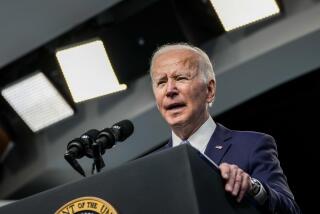Recommitment on AIDS
- Share via
The International AIDS Conference, now under way in Washington, has a global importance that few could have imagined when the first conference was held two years ago. It is now clear that no nation will likely escape the pandemic of acquired immune deficiency syndrome that already threatens an infected population of at least 5 million. Furthermore, it is now clear that the spread of the disease will be slowed only through close cooperation among nations.
This will in all probability not be an occasion for the announcement of breakthroughs. The enormously difficult task of seeking a vaccine to prevent the disease and medicine to cure it is inevitably slow. The testing of three treatments that show promise in extending the life of infected persons is just beginning.
But this will be the occasion for recommitment to four important tasks:
--Increasing the resources in money and talent in the search for vaccines and treatments.
--Endorsing the role of the World Health Organization to coordinate the international programs and to approve the national AIDS programs in Third World nations that require external foreign-aid support.
--Improving education programs to drive home to everyone the means of defense against AIDS.
--Resisting simplistic, hysteria-driven responses, including demands for mandatory testing programs, that make more difficult the efforts to control the spread in high-risk populations.
The opening of the conference came a day after President Reagan spoke, for the second time in his presidency, on the subject of AIDS. His words brought little cheer to the experts assembled from about 50 nations. He proposed expanded mandatory testing. Missing was the commitment to confidentiality in testing that experts believe to be essential for a successful program. But there was at least an appeal to “prevent the persecution, through ignorance or malice, of our fellow citizens.” Vice President George Bush reiterated the President’s message at the conference opening, adding welcome support of test confidentiality.
Those words of the senior leaders of the Administration lack the vigorous commitment that is required if the nation is to succeed in this crucial campaign. Furthermore, the words mask a failed commitment in resources. The federal allocations for AIDS research are widely judged to be inadequate. The United States has crippled the World Health Organization at this critical time by withholding $118 million of its $125.6-million assessed share of the current two-year operating budget--victim of the arbitrary budget-slashing involving both the White House and Congress. In addition, the Reagan Administration, joined only by Japan, is trying to squeeze an already zero-growth World Health Organization budget for the next biennium. And, at the same time, the United States has provided only $1 million and pledged another $5 million to the $37 million in voluntary contributions required this year for WHO’s special program on AIDS.
The credibility of American leadership was further eroded on Monday when both the President and the vice president dismissed demonstrations against their mandatory-testing proposals as the response of homosexual activists. In fact, the public-health professionals are the leading critics.
The United States cannot lead without committing resources. It cannot lead without the kind of commitment to public education so effectively demonstrated by the British government in the early months of this year. And it cannot lead if it continues to waste precious resources on such things as mandatory testing when every penny must be devoted to the needs that have already been identified by public-health professionals--needs that will certainly be even clearer when the International Conference ends on Friday.
More to Read
Sign up for Essential California
The most important California stories and recommendations in your inbox every morning.
You may occasionally receive promotional content from the Los Angeles Times.













